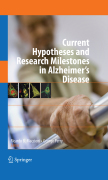
Current hypotheses and research milestones in Alzheimer’s disease
Maccioni, R.B.
Perry, G.
Almost four decades of innovative and intensive research on Alzheimer’s disease (AD) have brought major advances in our understanding of its pathogenesis, improved tools for diagnosis, and strategies for its treatment. This research has helped build a solid foundation of knowledge in the neurosciences and biological basis of AD and AD-related neurological disorders. Scientific background and insightful hypotheses are of major relevance in order to approach to an effective therapy for this devastating disease. Current Hypotheses and Research Milestones in Alzheimer's Disease contains 20 seminal chapters by authors with varying views on the neuroanatomical, neuropathological, neuropsychological, neurological, and molecular aspects of AD. These chapters grew out of Current Hypothesis on Alzheimer’s Disease, held in Viña del Mar, Chile, in November of 2007. Participants included the world’s leading Alzheimer’s researchers, whose work has illuminated AD investigations during the past few decades. Focuses on the latest research in Alzheimer’s disease presented at the InternationalConference on Current Hypotheses on Alzheimer’s Disease, November 22-25, 2007, in Viña del Mar, Chile INDICE: Proposed: Structural and functional aspects of neuron-glia dynamic.- APP, secretases and Aß-peptide.- Tau, protein kinases and phosphatases.- Neuroimmunology of AD. Cytokines.- Signals transduction mechanisms in AD.- Familial Alzheimer’s disease. Presenilins.- Synaptic transmission and cognitive phenomena.- Genetic and environmental risk factor for AD.- Cerebrovascular dementia.- Infectious basis for AD.- Bridges between brain function and mental phenomena in AD.
- ISBN: 978-0-387-87994-9
- Editorial: Springer
- Encuadernacion: Cartoné
- Páginas: 250
- Fecha Publicación: 01/02/2009
- Nº Volúmenes: 1
- Idioma: Inglés
